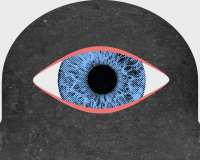Posted on Thu 16 Feb 2023
You'll be SHOCKED at how little it takes to get you to click on this post
Yes, we are going to talk about clickbait, and many other things social media has to offer

Posted by

Kexin Liu
Kexin Liu [Keshin Lee-o] is a Chinese multi-disciplinary artist and design researcher based in the UK.Project

Focus, but where?
An online interactive zine exploring climate change activism in our current information environment.Our mind works in fascinating ways, doesn't it? This title doesn't provide you with any concrete information on the post's contents, it only promises an emotional response, and yet here you are. As humans, we like to think that we are rational, sensible, introspective beings capable of making meaningful decisions that align with our long-term goals, but we also have a vulnerable side. We are prone to impulsive behavior, easily swayed by our emotions, and tend to fall for clickbait title when we know full well it is a trap.
One thing I've learned during my research is that it's not new to influence human behavior by tapping into different aspects of our psyche. The advertising business model was always there, but the tools we now have at our disposal to persuade, seduce, attract, and engage are much more powerful than before.
Digital technologies have drastically transformed our information environment over the last two decades. Internet and social media have blurred the lines between personal and mass communication, making it easy for anyone to create and share content with a global audience. And as information reaches overabundance, the competition for our limited attention intensifies. Tech companies are constantly devising new features and tactics to further exploit our weaknesses, a phenomenon aptly described by tech ethicist Tristan Harris as "a race to the bottom of the brain stem".
It all began with seemingly innocuous advertising techniques, bold fonts, vibrant colors, sensational language, catchy slogans, limited-time offers, etc. After we're hooked, features like infinite scroll (aka human-sized hamster wheel) and pull-to-refresh (aka information slot machine) will help keep us on the platform as long as possible, and once they gather enough data on our browsing patterns, advanced algorithms can then tailored content delivery, ensuring that the “right content” reaches us at precisely the right time.
Throughout this time, we believed that we were the customers, yet in reality, we are the products being sold to advertising companies, modified and customized into a downgraded version of ourselves that is easier to exploit, and we are not aware of this most of the time.
Yet ethicist James William believed that seeing the externalities of the attention economy only as small inconveniences is a grave misunderstanding of their nature. In the short term, distractions can keep us from doing the things we want to do. In the longer term, they can accumulate and keep us from living the lives we want to live, or even worse, undermine our capacities for reflection and self-regulation, making it harder, in the words of Harry Frankfurt, “to want what we want to want.”
Returning to the issue of climate change activism, my biggest concern is the way social media algorithms can reinforce people's existing beliefs and limit their exposure to differing perspectives. Echo chambers create individualized realities for each of us. Therefore, if you find it hard to understand why others might support a particular piece of climate data or take actions that differ greatly from your own after seeing what you see, it's likely that they aren't, they are living in and reacting to a different version of reality.
Compounding this issue is the fact that we all have confirmation bias, When we encounter something that challenges our beliefs on our news feed, we are more likely to quickly dismiss it and scroll past. So how can we take collective action when we cannot even agree on a shared reality?
_____________________________________________________________________
If you wish to learn more about the attention economy, persuasive technology, dark patterns, etc. Here is a list of recommended content to get you started:
Center for Humane Technology
Your Undivided Attention podcast
The Social Dilemma
Stand out of our light by James William
C. Thi Nguyen: The Gamification of Public Discourse
How To Do Nothing by Jenny Odell